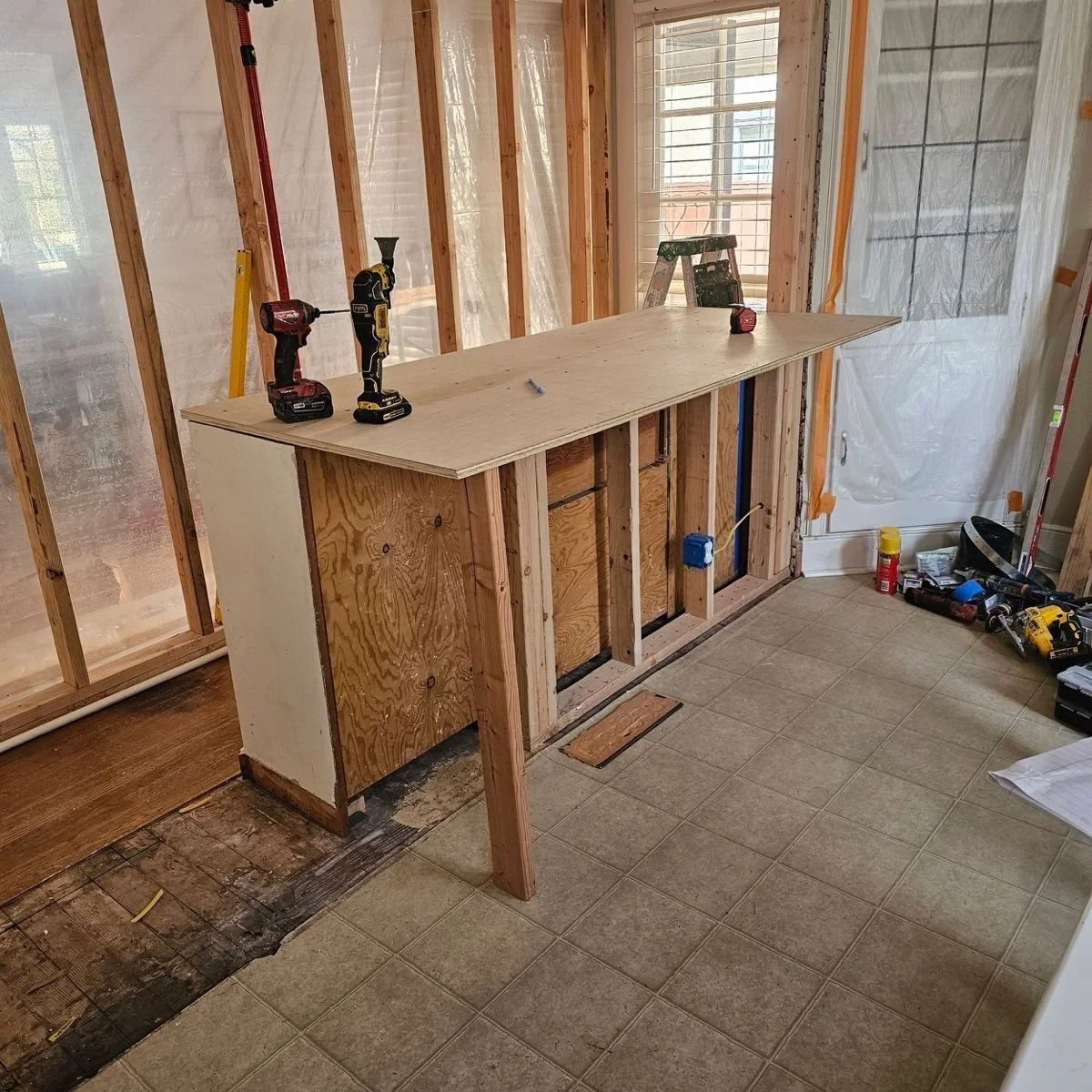Lincoln’s Most Common Home Remodeling Mistakes (and How to Avoid Them)
Professional contractors don’t skip the planning stage. They treat it as the backbone of the project.
A successful home renovation begins long before demolition starts. One of the most common mistakes homeowners make in Lincoln is jumping in without a clear, detailed plan. Some folks take a “we’ll figure it out” approach, which quickly leads to mid-project design changes, blown budgets, and the kind of delay that turns a kitchen upgrade into three months of microwave dinners.
Professional contractors don’t skip the planning stage. They treat it as the backbone of the project. Layout sketches, material selections, permits, budget discussions, and timelines all take shape before anyone picks up a tool. A written agreement with clearly defined goals keeps everyone on the same page. When the vision exists on paper, the project gains direction.
Choosing Style Over Structure
Pinterest boards and magazine spreads can tempt anyone to chase trends. Focusing too much on aesthetics while overlooking the home’s structural needs invites trouble. Replacing vintage windows with oversized ones may look great until the wall starts to sag. Removing a wall without confirming if it’s load-bearing creates more problems than it solves.
Strong remodeling decisions blend design with practicality. Contractors who prioritize both can preserve a home’s integrity while still modernizing the space. If removing a wall involves re-routing HVAC or reinforcing beams, those changes belong in the original estimate, not as surprises later.
Underestimating the Budget
Few things derail a renovation faster than the phrase “we’re over budget.” Yet underestimating costs happens all the time in Lincoln home projects. Whether it’s a small bathroom update or a full-home remodel, expenses tend to stack up. Materials, labor, permits, and deliveries all need flexibility in the budget.
Experienced remodelers always build in a cushion. One loose tile may reveal subfloor issues, and an old fuse box might call for an entirely new panel. Planning only for perfect conditions leads to disappointment. Reliable contractors outline a budget range that includes common curveballs, helping homeowners prepare without sacrificing quality.
Hiring the Wrong Contractor
Picking a contractor based only on price often leads to regret. The lowest bid may hide poor craftsmanship, lack of licensing, or missed deadlines. Plenty of Lincoln homeowners have learned the hard way that not all contractors are created equal.
Choosing a licensed, reputable contractor changes the outcome. The right team explains their pricing, provides timelines, and communicates clearly. They show up when scheduled, carry insurance, and stand by their work. Asking for references and checking past projects protects homeowners from hiring someone who cuts corners.
Ignoring Permits and Codes
Skipping permits might seem like a shortcut, but it causes bigger problems down the road. In Lincoln, unpermitted work opens the door to fines, delays, and insurance trouble. Resale also becomes complicated, since inspectors flag unauthorized changes right away.
A seasoned contractor knows exactly which parts of a project require permits. Anything involving structural changes, electrical systems, plumbing, or HVAC typically must follow local codes. When permits are handled properly, they keep projects legal and on schedule.
Choosing Trend Over Timelessness
Bold design choices might turn heads today, but they often age quickly. A neon-tile bathroom might impress on social media, but it feels outdated in a year or two. Avocado-colored kitchens and shag carpet were once trendy, too.
Balancing personal taste with long-term appeal creates better results. Neutral colors, classic finishes, and functional layouts stand the test of time. A contractor with a good design eye can help bring personality into the space without locking it into a short-lived style.
Trying to DIY the Big Stuff
Painting a room? Sure. Changing a faucet? Possibly. But gutting a kitchen, rewiring electrical, or moving plumbing lines? That’s a whole different level. Major renovations require tools, training, permits, and plenty of experience.
In Lincoln, many remodeling projects start as ambitious DIY attempts and end with a professional rescue call. Pros avoid common pitfalls, navigate inspections, and handle tricky installations. When it comes to the big jobs, saving money by doing it yourself often leads to costly mistakes.
Skipping the Punch List
Finishing a remodel doesn’t mean packing up the tools and walking away. The final walkthrough, or punch list, brings quality into focus. A loose cabinet pull, paint smudge, or uneven outlet cover may seem minor, but they add up fast.
Top-tier contractors invite this final step. The punch list becomes a checklist for polish and pride in the finished work. It’s often the difference between a decent outcome and one that feels complete.
Choosing the Wrong Materials
Material selection plays a huge role in both appearance and longevity. Opting for the cheapest flooring or low-end cabinets might seem smart at first, but it leads to early wear and tear. In Lincoln, where seasons shift dramatically, poor materials suffer even more.
A good contractor helps prioritize spending. For example, budget tile might work in a guest bathroom, but high-traffic areas like kitchens demand durability. Knowing when to splurge and where to save keeps the home both beautiful and functional.
Neglecting the Exterior
Remodeling tends to focus on indoor spaces, but the exterior deserves attention, too. Cracked stucco, chipped paint, and unkempt landscaping bring down the whole vibe, no matter how stunning the interior may be.
Adding exterior work into the renovation plan gives the home a finished, cohesive look. New paint, fresh lighting, or a welcoming entry door creates curb appeal that matches the care shown inside. Small upgrades on the outside make a big difference.
Losing Sight of the Home’s Character
Lincoln homes often come with history and personality. From craftsman-style bungalows to post-war ranches, each one has something special. Replacing every unique detail with something sleek and modern can strip away that charm.
Good remodeling respects the home’s roots. Contractors who understand local architecture know how to blend old and new. Restoring original trim, refinishing wood floors, or keeping built-ins preserves the character that made the home appealing in the first place.
Thinking Short-Term
Renovations often address immediate needs such as creating a nursery, carving out a home office, or adding space for an aging parent. Those are important, but thinking beyond today builds smarter homes.
Contractors with vision suggest options that grow with the household. Flexible layouts, energy-efficient upgrades, and aging-in-place features add long-term value. Projects built for both now and later reduce the need for frequent updates.
Trusting the Process Without Letting Go of the Vision
A great remodel strikes a balance between the homeowner’s vision and the contractor’s expertise. When either party checks out or takes over completely, the project suffers. Contractors bring skills and knowledge, while homeowners bring purpose and passion.
The best results happen through teamwork. Regular updates, clear decisions, and a collaborative spirit keep everything on track. Staying involved without micromanaging gives the contractor room to work while still reflecting the homeowner’s vision.
Lincoln Remodels That Start Strong and Finish Smart
Plenty of renovation mistakes are avoidable with a little planning and the right professional support. Great projects start with clarity, grow through communication, and wrap up with satisfaction built into every detail.
Every Lincoln home has a story worth continuing. Working with local experts who understand that story ensures the renovation adds the next great chapter—one you’ll be proud to live in for years to come.

